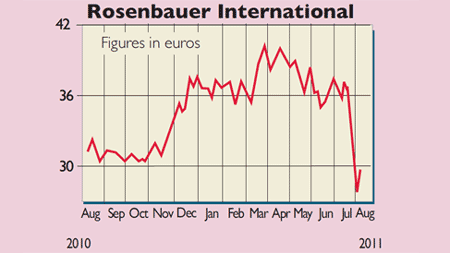
Austrian fire-engine maker Rosenbauer is one of the world’s largest manufacturers of response vehicles used to fight municipal (76% sales), airport (20%) and industrial (4%) fires. As the latest crisis unfolds, it could prove a safe place to hide.
That is because the fire equipment sector is a big lagging indicator for the wider economy, which is still slowly making its way through the final throes of the 2008 banking collapse. Yet Rosenbauer was only affected in 2009 when orders began to decline in America (down 10%) and Germany (15%) between 2009 and 2010. It is not yet completely out of the doldrums since German orders are expected to shrink another 10% in 2011.
So why my interest? Well, this contraction has inadvertently created pent-up demand for new, modern equipment.
There are only so many fires that even the most advanced vehicle can tackle safely without endangering lives. Many trucks currently in service are worn out and are in urgent need of replacement.
Rosenbauer International Ag (Austria: ROS)
That’s evidenced by the firm’s chunky order backlog of €431m in March. This, in turn, provides ample visibility for 2011, particularly as most purchasers are public-sector clients who rarely cancel orders other than in exceptional circumstances.
What’s more, Rosenbauer is not performing all that badly. In 2010 the company achieved sales and underlying earnings before tax and amortisation (EBITA) of €595m and €46.2m respectively, alongside offering a €1.2 dividend (yield 3.6%).
Going forward, although turnover (€570m) and profits (€45m) are projected to drop slightly in 2011 owing to continued softness in Germany, I expect this will reverse in 2012. Results should also be boosted by the upgrade cycle and by greater security needs in the wake of global catastrophes and terrorist attacks. On this basis I would value Rosenbauer on a 2011 EBITA multiple of eight, which – adjusting for net debt of €58m – delivers an intrinsic worth of €44 per share.
Of course, no investment is risk-free. For me the chief concerns are those associated with future public sector spending cuts – although these can only be put off for so long. In addition, in the unlikely event that volumes soften materially, profits could be defended by laying off temporary staff and in-sourcing some, or all, of its third-party manufacturing in order to maintain factory utilisation rates. The first-half results are due out on 26 August. There is a 44% free float, with 51% of the remaining shares owned by the Rosenbauer family.
Rating: BUY at €32 (market cap €220m)